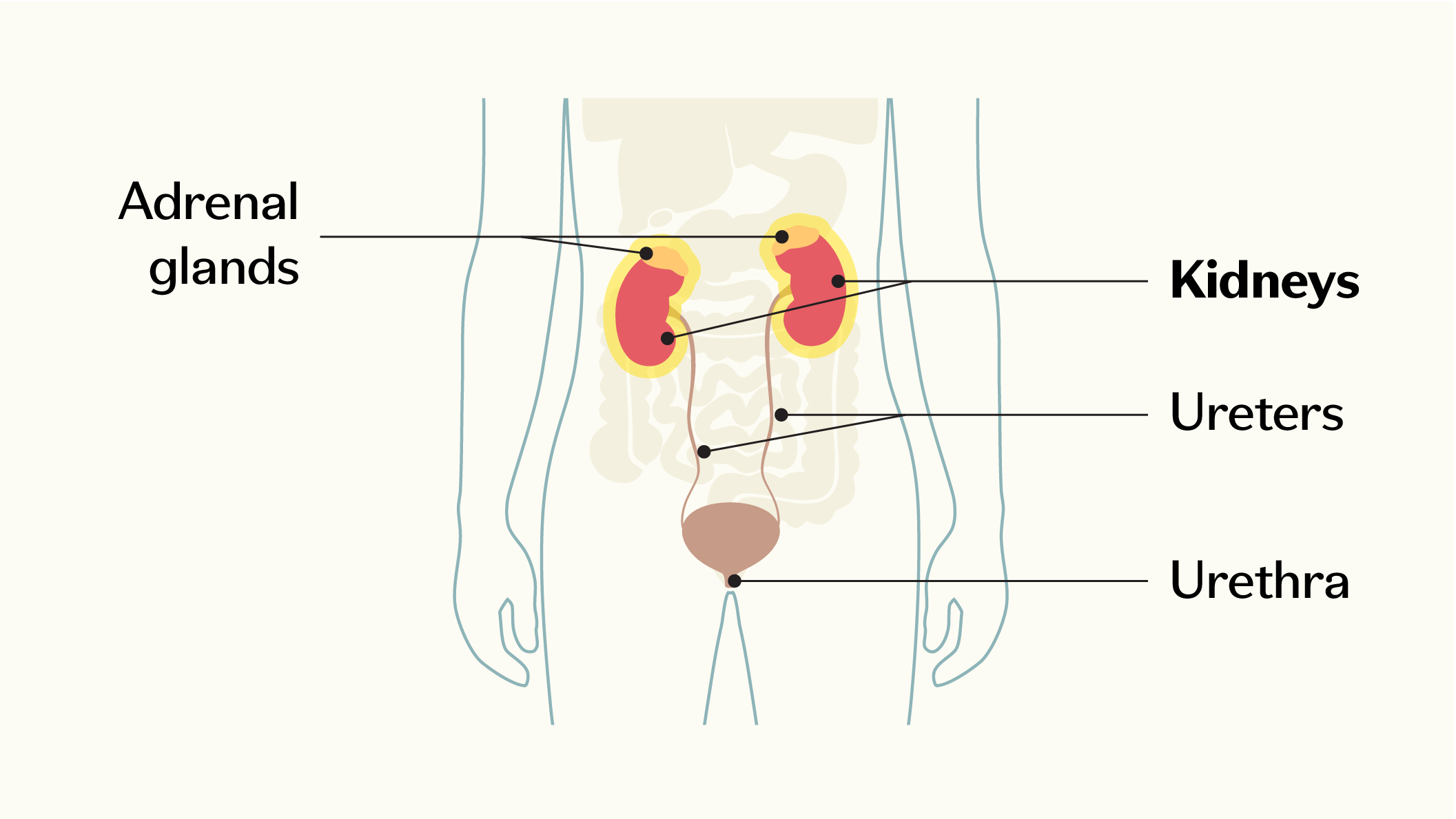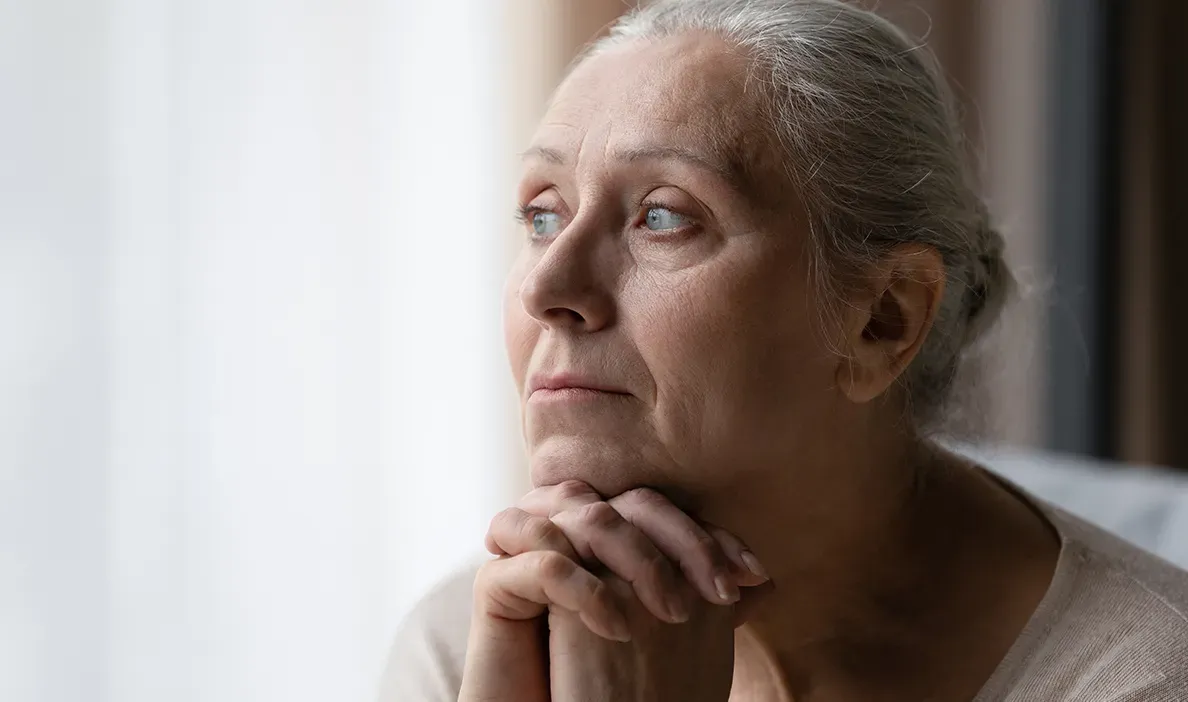The kidneys
The kidneys are two bean-shaped organs that are near the middle of your back, one on either side of your spine. The job of the kidneys is to filter blood to remove excess water and waste, which leave our body as urine (wee). 1,2

How kidney cancer starts
Kidney cancer starts when the abnormal kidney cells begin to grow and divide uncontrollably, forming a cluster of cells called a tumour.1,
The main causes of kidney cancer are unknown, but there are certain factors that can increase the chances of someone getting kidney cancer. This could include smoking, obesity, high blood pressure, kidney disease, diabetes, family history and genetics. While anyone can develop kidney cancer, it is more common in adults over 60 years old.3,4
Types of kidney cancer
The kidneys are made up of lots of different types of cells. Cells are the building blocks of every part of your body.4 The type of kidney cancer you have depends on the type of cell the cancer started in.5
The most common type of kidney cancer is renal cell carcinoma (RCC), accounting for about 80% of cases. It starts in the lining of the tiny tubes within the kidneys.5
Less common types of kidney cancer are:
- cancer of the collecting duct
- renal medullary cancer5
Treatment options for kidney cancer
The exact treatment someone is given for their kidney cancer depends on a few things. These include the type of kidney cancer, what stage it is (how far it has grown within the kidney or if it has spread to another part of the body), and the person’s general health.6
There are a few treatment options available for kidney cancer:6
- Observation/monitoring: In some cases, especially when the cancer is small and not causing symptoms, doctors might recommend regular monitoring instead of treatment
- Surgery: this is often the main treatment for kidney cancer. A partial nephrectomy involves removing part of the affected kidney to remove the cancerous tissue, and a radical nephrectomy removes the whole affected kidney7
- Targeted therapy: These medications target specific features of the cancer cells, to slow down their growth and stop them surviving in the body
- Immunotherapy: These treatments boost the body's natural defences to fight cancer, helping the immune system recognise and attack cancer cells
- Radiation therapy: This treatment is often used to help with symptoms rather than as first treatment. It uses high-energy rays to target and kill cancer cells
- Tumour ablation: This treatment uses a needle or probe that goes through your skin and into the kidney, and uses radiofrequency energy to heat and destroy the tumour.8
- Cryotherapy: This treatment sends cold gas through a needle into the kidney to freeze and kill cancer cells
Each treatment plan is tailored to fit individual needs and will be unique to you. It's important to discuss all available options with your healthcare team to determine the best course of action for you.
Remember, you're not alone on this journey. You can reach out to your healthcare team, family and support groups for comfort and guidance.
Explore More on Kidney Cancer

If you or someone you know has been diagnosed with cancer, support groups and charities are great places to find information and connect with people going through a similar experience.

Life with cancer is different for everyone. So, if you need support, it should be personal to you. ByYourSide has been created by Pfizer to offer you practical support and guidance to help you manage life with cancer in a way that is best for you.
References
- Cancer Research UK. What is Kidney Cancer? Available at: https://www.cancerresearchuk.org/about-cancer/kidney-cancer/about [Accessed May 2025].
- National Library of Medicine. Why is genetics important to my family and me? Available at: https://www.ncbi.nlm.nih.gov/books/NBK115604/ [Accessed May 2025].
- Macmillan. Kidney cancer. Available at: https://www.macmillan.org.uk/cancer-information-and-support/kidney-cancer [Accessed May 2025].
- Macmillan. Causes and risk factors of kidney cancer. Available at: https://www.macmillan.org.uk/cancer-information-and-support/kidney-cancer/causes-and-risk-factors-of-kidney-cancer [Accessed May 2025].
- Cancer Research UK. Types and grades of kidney cancer. Available at: https://www.cancerresearchuk.org/about-cancer/kidney-cancer/stages-types-grades/types-grades [Accessed May 2025].
- Cancer Research UK. Treatment options for kidney cancer. Available at: https://www.cancerresearchuk.org/about-cancer/kidney-cancer/treatment/decisions [Accessed May 2025].
- Cancer Research UK. Surgery for kidney cancer. Available at: https://www.cancerresearchuk.org/about-cancer/kidney-cancer/treatment/surgery [Accessed May 2025].
- Macmillan. Tumour ablation for kidney cancer. Available at: https://www.macmillan.org.uk/cancer-information-and-support/treatments-and-drugs/tumour-ablation-for-kidney-cancer [Accessed May 2025].


